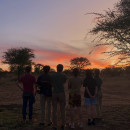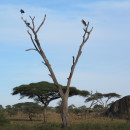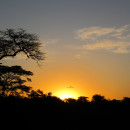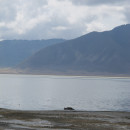A new home in Tanzania: life-changing and eye-opening! January 23, 2023
By Georgiana D (Biological sciences and environmental studies, Wellesley College) - abroad from 08/31/2022 to 12/13/2023 with
The School for Field Studies / SFS: Tanzania - Wildlife Management Studies
Beyond just new academics, this program was really a learning experience in a different lifestyle. It taught me flexibility, "pole-pole" or slow-living, the beauty of being present, a reduction in materialistic tendencies (which the world needs more of), and made community a greater priority in my life. I can't speak well enough of these non-academic lessons, of which there were so many. It is something everyone should experience--so yes, it is more than worthwhile.
Review Photos





Personal Information
| How much international exposure did you have prior to this program? | 1 month - 6 months |
Review Your Program
|
* Overall educational experience
Academic rigor, intensity, resources, etc. |
The classes were very demanding, up to 6 hours in class for 5 days a week and then a half day on Saturday. However, they were incredibly rewarding, of exciting subject matter, and the field lectures/game drive activities were absolutely astounding and great experiences. |
|
* Host Country Program Administration
On-site administration of your program |
I always felt welcomed, safe, and cared for at SFS Tanzania. The staff was so sweet, the faculty knowledgeable, and the grounds well cared for and inviting. |
|
* Housing:
How satisfied were you with your living arrangements? |
Incredibly pleased. The grounds were well cared for and the bandas (cabins) were well set up, with plenty of space and fine utilities. Everything was always neat and there was maintenance available if it was ever needed. Note, you do your own cleaning for you room, so it will be as nice as you allow it to be! |
| * Food: |
There are two main takeaways here. The food was never bad--it was really rather good, comparable to the cafeterias at school. However, there is LOTS of repetition. By the end of the program, I swore to not eat lentils for at least a year. If this doesn't bother you, you're set. If it does, maybe bring some of your favorite snacks, spices, sauces, or whatever to kick it up a notch and get some variety in. HIGHLY suggest bringing water flavoring and electrolytes. This is suggested on the packing list by SFS but it can't be exaggerated enough how important this is! |
|
* Social & Cultural Integration:
How integrated did you feel with the local culture? |
Social and cultural integration is NOT the key point of this program--it's research-based. If you want a true cultural experience, you'll want to pick a different program. It's very controlled, with strict curfews (hyenas!!), and because of the rigor of academics, there's not a ton of time to get out and do stuff on your own, though your priorities may be different while studying abroad than my own. That being said, I am still very satisfied with the integration we did receive. I feel as though I experienced far more through this program than I ever would've through just a safari. You live with Tanzanian staff, the center is in the middle of Rhotia, a lovely town that you can walk to and enjoy its few little stores and such, you have field lectures where you meet local experts, and you have a couple of day-long homestays with a few families/tribes to attempt to get a view of their lives. It's not as much as I would have liked, but due to the nature of the program, it was adequate. |
|
* Health Care:
How well were health issues addressed during the program? |
The healthcare was fine--I won't say it was great, but it was fine. Healthcare is not as developed in Tanzania as it is in America, and if anything super serious were to happen, you would have to be driven or flown to either Arusha, Tanzania, or Nairobi, Kenya. However, for the common things to happen on this program (perhaps a bad stomach issue, a sprained ankle, a UTI, etc.,) there is a clinic only about 20-30 minutes from the campus that does a fine job. We had several students visit and they always sang its praises. The wellness manager was helpful with the little things as well and pushed us to go to the clinic when she thought it was needed. She always had extra electrolytes when we went on game drives and antibiotics for the very common upset stomach. The first aid kits were sometimes a little lacking in band-aids and such, but if a student asked about it they would find the supplies they needed. I always felt as though if anything happened (of which nothing did) that it would be no problem to get the care I needed. |
| * Safety: |
I never felt in danger at any point during this program. The center has a locked gate surrounding it, guards are always nearby, the drivers are excellent, and even when camping in the middle of the Serengeti the security team kept us safe and sleeping happily. You were never alone and the staff always knew where you were (sign out sheet when students leave let them know where you're going in Rhotia, otherwise they drive you themselves). |
| If you could do it all over again would you choose the same program? |
Yes
I cannot express how much I adored this program. It is not glam living, and the classes are rigorous, but it was absolutely astounding. My cohort was amazing and we all got along so well (bonding occurred through card games, movie nights, lots of hugs, and shared experiences, to name a few!), the staff and faculty really became a second family, and I mean, come on--game drives??? Elephants?? Lions?? All the wildlife and amazing landscape?? What more do you really need? |
Finances
|
* Money: How easily were you able to live on a student's budget?
(1 = not very easy/$200+ on food & personal expenses/week, 2.5 = $100/week, 5 = very easily/minimal cost) |
"Per week" really isn't a great measure for this program, as some weeks went by without spending a dime and others I would drop $100 a day at a market. That being said, I spent $700 over the length of the program, which is about $46 a week. Even then, I bought all my Christmas gifts for friends and family, which is not something you need to do if you're tight on money! |
| Not including program expenses, about how much money did you spend on food and other expenses each week? | Again, this really isn't a great measure for this program, but it was about $46 a week. |
| Do you have any general money-saving tips for future study abroad participants? | If you're tight on change, avoid buying food and drinks because it's always available through the program. You also don't need to buy all your Christmas gifts like I did--that would save a lot! |
Language
| * Did your program have a foreign language component? | Yes |
|
How much did the program encourage you to use the language?
0 = No encouragement, 5 = frequent encouragement to use the language |
It was very encouraged to use the language because several of the staff members didn't speak English and even among those who did they would most often greet you in Swahili to get you to practice. It was honestly wonderful and they're all super helpful! |
| How would you rate your language skills at the beginning of the program? | None |
| How would you rate your language skills at the end of the program? | Beginner |
| What was the highest level language course you had completed prior to departure? | I had taken no Swahili, but several 200-level Spanish courses (that were of no help here). |
| How many hours per day did you use the language? | |
| Do you have any tips/advice on the best ways to practice the language for future study abroad participants? | Really try to use it daily! I regret not trying to more--I could have had better conversations with staff beyond just greetings, and it helps for the Swahili exam too, which really appears suddenly! Just chat with staff and practice among each other--everyone is supportive and/or learning! |
Other Program Information
|
* Where did you live?
Select all that apply |
|
|
* Who did you live with?
Select all that apply |
|
|
* Who did you take classes with?
Select all that apply |
|
| About how many local friends did you make that you will likely keep in touch with? |
A Look Back
| * What did you like most about the program? |
|
| * What could be improved? |
|
| * What do you know now that you wish you knew before going on this program? | I wish I had better prepared myself mentally for how much time would be spent in the classroom, and for the flexibility it would require in not having a steady schedule. Otherwise, I feel as though I was pretty well prepared. If I could pass on one piece of advice that worked super well among our cohort, it would be to stay open and vulnerable! Be willing to share with, be affectionate with, and be close to the other students. It WILL create lifelong friendships if you allow this to occur. |
Reasons For Studying Abroad
| To help future students find programs attended by like-minded individuals, please choose the profile that most closely represents you. |
The Avid AdventurerThe wardrobe you packed was better suited for a semester of camping than club hopping. Outdoorsy, you might forgo a crazy night out for an early all-day adventure. You'd rather take in the rich culture of an old town than the metropolis of a modern city, but for you getting off the grid is ideal. |








